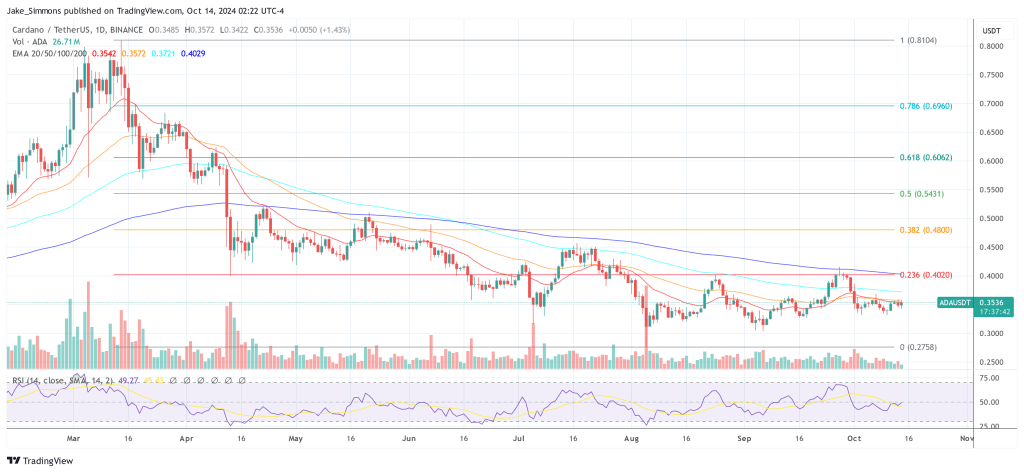Charles Hoskinson, the creator of Cardano, recently revealed a plan for blockchain governance during a live stream. He introduced a concept he calls a “Bill of Rights” aimed at establishing foundational principles for the Cardano ecosystem. This initiative emphasizes 11 core tenets vital for guiding the development and governance of Cardano, with the potential to influence other blockchain technologies.
During his live transmission from Colorado on October 13, 2024, Hoskinson highlighted the collaborative effort that has gone into this initiative. He noted, “We have already conducted over 50 workshops,” with participation from 1,400 people and the election of 63 delegates.
Central to Hoskinson’s announcement was a blog post titled “The 11 Blockchain Tenets Towards a Blockchain Bill of Rights.” He pointed out that these tenets are designed not only for Cardano but as a universal guideline applicable across various blockchain platforms. “These principles aim to encapsulate the enduring nature of these systems and safeguard the rights of users,” he stated, drawing comparisons to constitutional human rights.
The 11 Cardano Blockchain Tenets
Hoskinson elaborated on each tenet, explaining their importance and their implications for Cardano:
- Transaction Censorship Resistance: “Transactions must flow freely and without delay,” Hoskinson asserted, comparing this to freedom of speech. He stressed the importance of user autonomy, stating that users should have the freedom to interact with the system as they see fit, free from censorship.
- Predictable Transaction Costs: He emphasized that transaction costs should be fair and predictable, which is key for user planning and system sustainability. Efforts are being made to introduce tiered pricing and intent-based ledgers to manage user needs better.
- Fair Recognition And Compensation: Hoskinson called for equitable acknowledgment of all user contributions, asserting that each individual’s input should be processed fairly to maintain the integrity of rewards within the ecosystem.
- Data And Value Portability: Citing principles akin to the EU’s GDPR, he noted that user consent is critical in data handling. “Users should control their data and the value they create,” he pointed out.
- Resource Efficiency: “We must minimize unnecessary resource expenditures,” he stated, focusing on efficient protocol design to uphold long-term viability and prevent systemic issues such as bloat.
- Safe Preservation Of Value And Information: This principle aims to protect both data integrity against threats and value stability through mechanisms like stablecoins, highlighting the dual aspects of asset security.
- Minimization Of Unnecessary Resource Expenditure: Here, Hoskinson pointed out the need for optimizing resource use in Cardano’s operations, giving examples like improvements from Plutus V1 to V2 that have cut transaction sizes.
- Fair And Representative Governance: He stated that the system should evolve based on collective user input, with an upcoming Constitutional Convention in Buenos Aires aiming to formalize these governance principles.
- User Privacy Preservation: Highlighting data privacy, Hoskinson emphasized the need to protect users’ actions and information while advocating for controlled disclosure practices.
- Compliance with Local Laws and Regulations: He explained that the system will ensure users can engage without violating local laws, acknowledging the diverse jurisdictions where Cardano operates.
- Transparency, Predictability, and Verifiability: Finally, he stressed the necessity for the system’s operations to be clear and accountable, supporting open-source protocols to maintain trust within the ecosystem.
Moving Forward
Hoskinson detailed plans to solidify these tenets through decentralized governance. He remarked, “Decentralized governance is essential before we move forward, as it unifies decision-making for all.” The upcoming Constitutional Convention in Buenos Aires, set for December 2024, will bring together delegates to finalize the constitutional text based on these tenets.
Emphasizing the broader implications, Hoskinson suggested other blockchain communities might adopt this governance framework to harmonize technological advancements with ethical considerations. “These principles are under active discussion within the Cardano community and will guide both Cardano and other blockchain ecosystems towards their envisioned futures,” he noted.
He concluded by stressing the importance of prioritizing the system’s integrity over immediate gains, stating, “We should never compromise the system’s integrity for short-term benefits, such as token price or adoption metrics.”
At the time of writing, ADA was valued at $0.3536.






